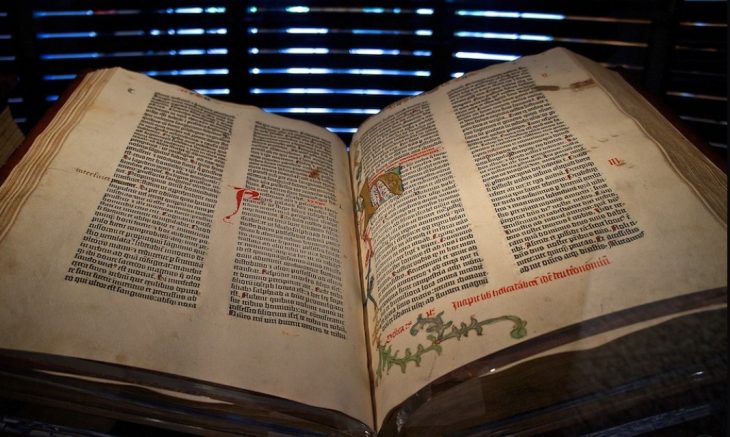
Word of the Day: Discern
Today’s word of the day, thanks to the Word Guru, is discern. Discern is a verb that means “to perceive by the sight or some other sense or by the intellect; see, recognize, or apprehend,” or “to distinguish mentally; recognize as distinct or different; discriminate,” or “to distinguish or discriminate.” That last definition is when the verb is intransitive.
The word appears in the language in the “late 14c., from Old French discerner (13c.) ‘distinguish (between), separate’ (by sifting), and directly from Latin discernere ‘to separate, set apart, divide, distribute; distinguish, perceive,’ from dis– ‘off, away’ (see dis-) + cernere ‘distinguish, separate, sift (from PIE root *krei- ‘to sieve,’ thus ‘discriminate, distinguish’)” (https://www.etymonline.com/search?q=discern). It is notable that the word originally, in Latin, refers to a physical activity, sifting, but then changes into a mental activity.
On or abour this date in 1455, Johannes Gutenberg printed his first Bible.
Printing is 5,000 years old, and human beings have invented a variety of ways to print things. In China, a method of printing on paper was invented using carved blocks of wood. This wood block printing spread to many other countries. The use of moveable type was also invented in China, and there are examples of texts printed with moveable type from Japan and Korea. But wood block printing was always more popular.
Johannes Gutenberg (c.1400-1468) was a German inventor who combined the idea of moveable type with a mechanical press and with mass-produced pieces to create the first modern printing press. He was born and raised in Mainz. His father was from the upper class, but little else is known. He may have gone to the University of Erfurt, though that is based on just a name. The first we know for sure of him is from a letter in 1434. He was living at that time in Strasbourg, which is in the Alsace region that borders France and Germany. Today the city is part of France, but in 1434 it was part of Germany. He apparently was involved in a failed business venture that involved polished mirrors and capturing light off of relics—relics were a big business for the Church in the Middle Ages. But a plague and some other problems postponed the display of relics in the city of Aachen, and Gutenberg’s investment came to nought.
It was shortly after this that he published a little book called Aventur und Kunst (Enterprise and Art) that laid out some of his ideas for the invention of a printing press. He apparently blended the manufacture of moveable metal pieces with the pressing action of wine presses to come up with the invention of a moveable type press.
Back in Mainz by 1848, he may have borrowed some money from his brother-in-law for the printing press. By 1850, he had the printing press in operation and had published a few things. He may even have had two printing presses going on at the same time, one for the Bible project he was working on, and the other for practical documents, like papal bulls, which need to be printed and spread, and indulgences, a big money maker for both Gutenberg and the Church.
There is a certain irony in Gutenberg printing indulgences. It was the sale of such indulgences, that would grant forgiveness of sins for a certain amount, and for sins not yet committed for a somewhat larger amount, that angered Martin Luther and launched the Protestant Reformation. Many people associate the Gutenberg Bible with Luther, but the Gutenberg Bible was printed in Latin, not in German.
The major contribution of Gutenberg’s moveable type press was that it revolutionized the dissemination of information. Books were suddenly available to the middle class, and that was important for the Reformation because Luther preached the “priesthood of all believers.” In other words, every Christian was encouraged to read the Bible for themselves rather than relying on what the priest in the church said.
Of course, one of the problems with lots of different people reading and interpreting the Bible on their own was that there was, and still is, a lot of disagreement about what the Bible says. For instance, here is a passage from 1 Corinthians 11, verses 23-29: “For I received from the Lord what I also passed on to you: The Lord Jesus, on the night he was betrayed, took bread, and when he had given thanks, he broke it and said, ‘This is my body, which is for you; do this in remembrance of me.’ In the same way, after supper he took the cup, saying, ‘This cup is the new covenant in my blood; do this, whenever you drink it, in remembrance of me.’ For whenever you eat this bread and drink this cup, you proclaim the Lord’s death until he comes. So then, whoever eats the bread or drinks the cup of the Lord in an unworthy manner will be guilty of sinning against the body and blood of the Lord. Everyone ought to examine themselves before they eat of the bread and drink from the cup. For those who eat and drink without discerning the body of Christ eat and drink judgment on themselves” (NIV).
In that last verse, the translation says “discern,” which we know now means to perceive through the eyes or other senses. One of the big arguments among different Protestant denominations is, of course, whether the bread and wine in communion is really the body and blood of Christ. If we accept the translation as discern, and if we understand what discern means, well, I’ll leave it up to you.
The image today is of “One of twenty-one surviving complete copies of the Gutenberg Bible, according to Wikipedia. This one is located at the Harry Ransom Center on the University of Texas campus” (https://www.flickr.com/photos/atmtx/5473218968).